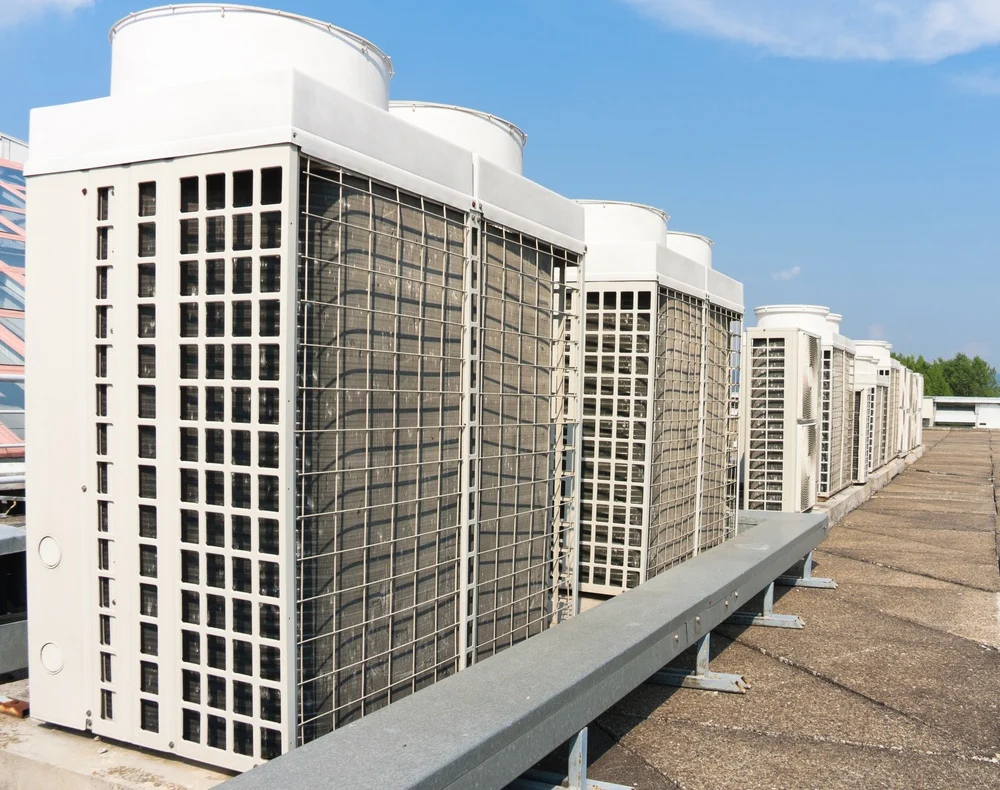High-Efficiency Heat Pumps
High-efficiency heat pumps are a critical technology for reducing greenhouse gas emissions in the heating and cooling sector. These systems transfer heat from the air, ground, or water to provide efficient heating and cooling for residential, commercial, and industrial applications.

Image Credit: Euractiv
job openings
View open jobs in this Solution
Example Companies
- Mitsubishi Electric - Develops advanced heat pump technologies for residential and commercial use.
- Daikin - Specializes in air conditioning and heat pump systems.
- Carrier - Provides high-efficiency heat pumps and HVAC solutions.
- Trane Technologies - Focuses on sustainable heating and cooling systems.
- Bosch Thermotechnology - Offers a range of high-efficiency heat pumps for various applications.
Overview
High-efficiency heat pumps are innovative systems that transfer heat from the air, ground, or water to provide efficient heating and cooling. These systems are essential for reducing energy consumption and greenhouse gas emissions in residential, commercial, and industrial settings.
Learn More
- Air-Source Heat Pumps: Moving air heat to stay warm or cool - Climate Tech Distillery
- Home Electrification Fights Climate Change - Warming Up to Climate Tech
Progress Made
Significant advancements have been made in high-efficiency heat pump technologies:
- Types of Heat Pumps: Development of air-source, ground-source, and water-source heat pumps.
- Applications: Used in residential, commercial, and industrial heating and cooling.
- Technological Innovations: Enhanced efficiency and sustainability in heat pump technologies.
Solutions by Sector
Residential
- Air-Source Heat Pumps: Extract heat from the air to provide heating and cooling for homes.
- Ground-Source Heat Pumps: Use the stable temperature of the ground to provide efficient heating and cooling.
- Water-Source Heat Pumps: Utilize water bodies as a heat source or sink for heating and cooling.
Case Studies:
- Mitsubishi Electric, Global: Develops advanced air-source heat pumps for residential use (Mitsubishi Electric).
- Daikin Altherma, Europe: Provides efficient ground-source heat pumps for homes (Daikin).
- Carrier Infinity, USA: Offers high-efficiency water-source heat pumps for residential applications (Carrier).
Commercial
- Variable Refrigerant Flow (VRF) Systems: Advanced heat pump systems for large commercial buildings.
- Packaged Heat Pump Units: Integrated systems for commercial heating and cooling.
- Heat Recovery Systems: Capture and reuse waste heat in commercial settings.
Case Studies:
- Trane Technologies, Global: Implements VRF systems for commercial buildings (Trane Technologies).
- Bosch Thermotechnology, Europe: Provides packaged heat pump units for commercial applications (Bosch Thermotechnology).
- Mitsubishi Electric, Global: Develops heat recovery systems for commercial use (Mitsubishi Electric).
Industrial
- Process Heat Pumps: Provide efficient heating for industrial processes.
- District Heating Systems: Use heat pumps for centralized heating in industrial parks.
- Waste Heat Recovery: Capture and reuse waste heat from industrial processes.
Case Studies:
- Daikin Applied, Global: Develops process heat pumps for industrial applications (Daikin).
- Carrier AquaForce, USA: Provides heat pumps for district heating systems (Carrier).
- Bosch Industrial, Europe: Implements waste heat recovery systems in industrial settings (Bosch Thermotechnology).
Lessons Learned
- Efficiency: High-efficiency heat pumps significantly reduce energy consumption and emissions.
- Technology Development: Continuous innovation is crucial for improving heat pump performance.
- Economic Incentives: Financial incentives encourage the adoption of heat pump technologies.
- Collaboration: Collaboration among manufacturers, policymakers, and consumers is essential for widespread adoption.
- Adaptability: Heat pump systems must be adaptable to different climates and applications.
Challenges Ahead
- High Initial Costs: The upfront cost of heat pump systems can be a barrier to adoption.
- Infrastructure Requirements: Installation of ground-source and water-source heat pumps requires specific infrastructure.
- Public Awareness: Increasing awareness about the benefits of heat pumps is crucial.
- Regulatory Support: Supportive policies and regulations are needed to promote heat pump adoption.
- Technological Advancements: Continued research and development are necessary to enhance heat pump efficiency and performance.
Best Path Forward
- Public Awareness: Educate consumers about the benefits of high-efficiency heat pumps.
- Incentives: Provide financial incentives for the installation of heat pump systems.
- Research and Development: Invest in R&D to improve heat pump technologies.
- Policy Support: Implement supportive policies and regulations to encourage adoption.
- Collaboration: Foster collaboration among stakeholders to promote heat pump installations.
Image credit: Euractiv